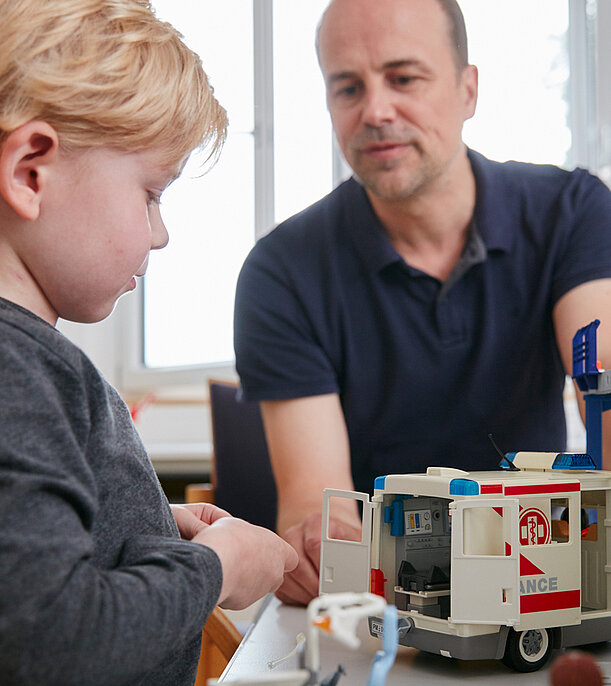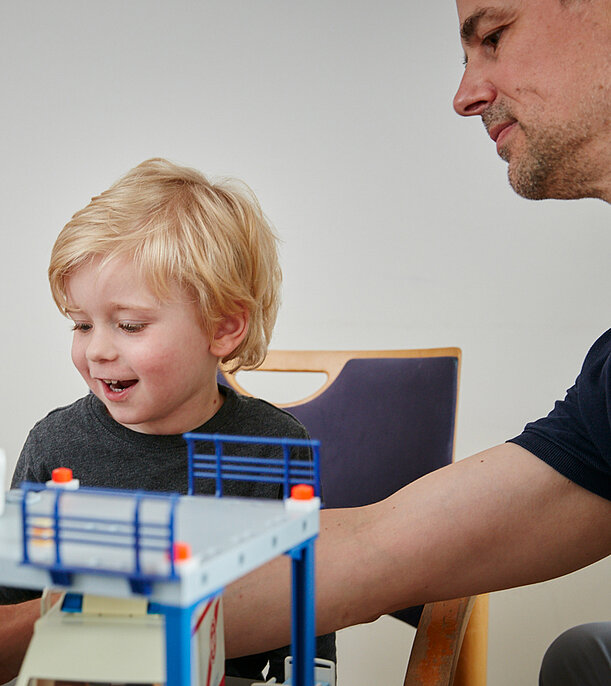
Psychology
Psychology helps to solve or cope with problems
Psychological aspects play a major role during a stay in hospital. We focus our attention on both the patients and their relatives. Our focal points are:
Psychological diagnostics
Psychological support or psychotherapy
Counselling and therapeutic support for the family

We use diagnostics to obtain a differentiated picture of the problems
As an introduction to the psychological support of the children and adolescents, we usually carry out a comprehensive (neuro-) psychological diagnosis.
Depending on the problem and the assignment, it includes the assessment of general mental performance (intellectual functions, thinking) as well as cognitive partial performances, such as memory, perception, attention and concentration, orientation, planning and problem solving. Emotional experience, motivation, personality and behaviour can also be assessed.
Depending on the question and the cooperation of the patient, we use different psychological methods (current test procedures, questionnaires or interviews):
Possible diagnostic goals are, in addition to the assessment of neuropsychological functions, the recording of individual resources, the assessment of the prospects of success of therapy options and the assessment of cognitive functions in the course.

Therapy can promote development and help overcome problems
Once we have understood which cognitive deficits, emotional disorders or traumatisation are present, a suitable therapy approach or support strategy can be selected, taking into account the underlying disease.
Possible therapy goals include improving brain performance, becoming aware of and working through traumatic experiences or psychological conflicts, and learning problem-solving strategies. In addition to acute crisis intervention, it is our goal that patients and their relatives and families benefit from these measures in the long term.

Emotional and cognitive problems are often closely linked, so that cognitive and psychotherapeutic therapy approaches are intertwined.
In individual and group psychotherapeutic treatments, we offer support to children and adolescents in the following area
- Various psychological problems or reactions (fears, sadness, insecurity, aggression, compulsive behaviour).
- dealing with their disability, its cause and the reactions of their environment
- dealing with traumatic experiences
- integrating the changes into their personal life and working out new perspectives for the future
- temporary separation from home.
We always tailor the psychotherapeutic offers individually to the persons and the possible disabilities. In addition, we offer psychotherapeutic talks, client-centred child psychotherapy, family therapy approaches as well as individually adapted techniques from different schools of therapy, for example resource activation, relaxation procedures and trauma-specific interventions, if required.

Based on the psychological diagnosis and knowledge of the underlying disease, targeted individual support is provided.
This includes learning skills to better cope with everyday life and compensatory strategies (memory strategies, etc.). In addition, there is functional exercise treatment of concentration, attention or perception as well as shaping the environment in the clinic and at home through orientation aids and guidance of the caregivers.

Counselling and therapeutic support for the family
Counselling and therapeutic support for the family
Especially in the case of long, stressful stays in hospital, psychological counselling can be an important measure to accompany and support those affected. In addition to the patients, our efforts therefore also focus on parents, family and other caregivers.
Here we offer psychological talks with different content appropriate to the situation. For example:
- Counselling regarding the stage/process of development
- Possibilities of relief for the family
- Assistance in coping with crisis situations
- specific questions about education
- The situation of siblings and other relatives
- Examination and counselling on further necessary support after the inpatient stay
Our aim is to provide support and help in finding the emotional meaning of events, to make hopes realistic or to work out solutions for narrowly defined issues.


